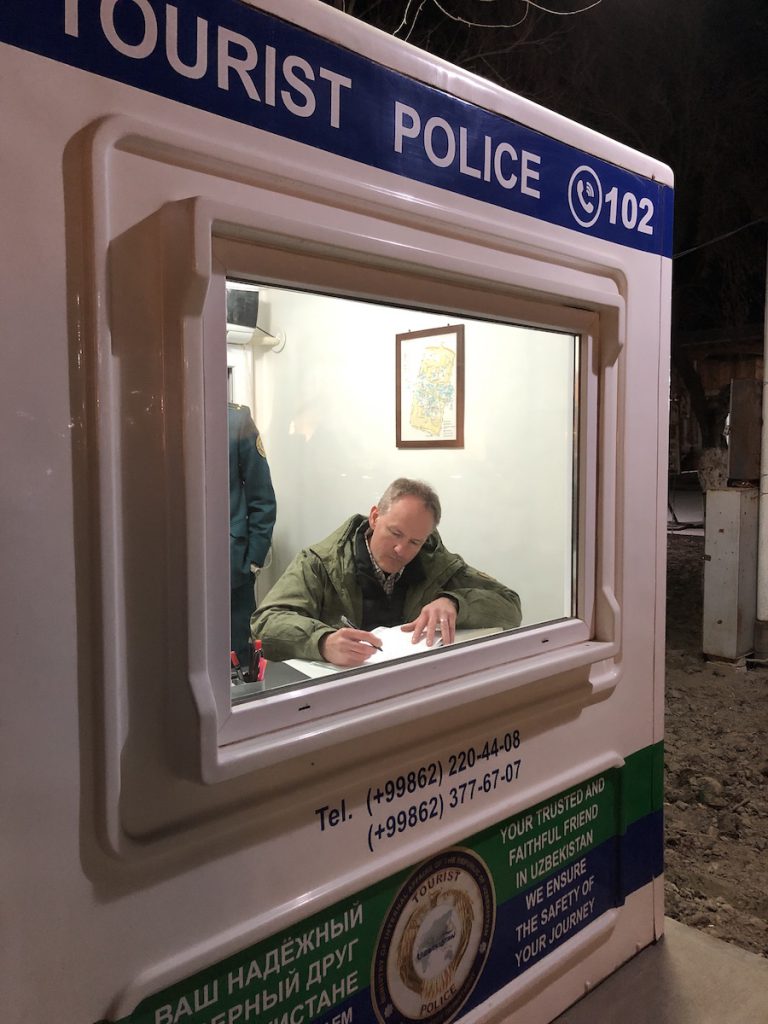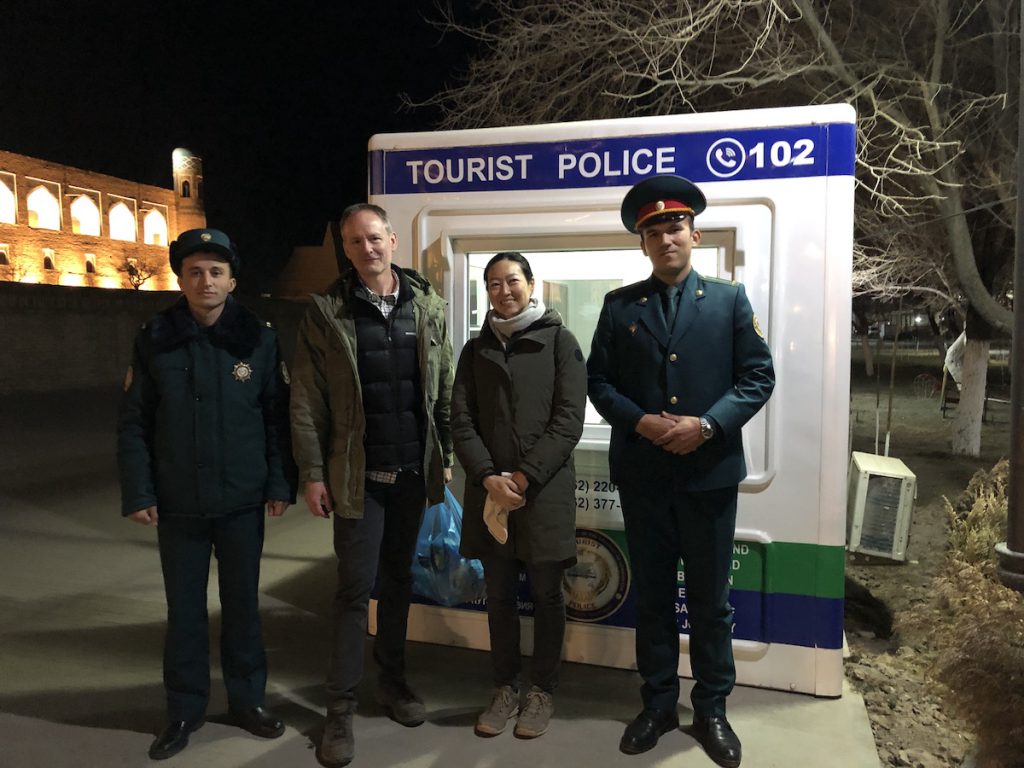“I’ll just stop by that ATM and get some cash.”
We’d been wandering Khiva’s old town all day, poking into forgotten madrassas, and I was running low on som. I’d seen both locals and foreigners use the West Gate machine, so I knew it accepted foreign plastic.
I slid in my Visa card, entered my PIN, and asked for 2,000,000 in cash.
I heard an agonized whirring from deep inside. It went on for some time.
These mechanical convulsions were eventually broken by the sliding open of a door at waist level.
It receded with all the ceremony of a magician revealing a woman sawn in half, but no matter how closely I inspected this cavity, I couldn’t see anything inside.
I looked from compartment to screen and back to compartment again.
Time slowed to the speed of a watched kettle.
The compartment creaked shut.
More noises came from inside, this time resembling a dot matrix printer busily churning out someone’s doctoral dissertation.
A slip of paper stuck out like a tongue and everything went silent.
The document confirmed that I had indeed withdrawn 2,000,000 som in cash — apparently invisible — and my pre-paid card was now empty. It was all the money I’d set aside for the trip.
“You’d better call that number,” my wife said, pointing at a piece of paper taped to the wall, with the words “Call for problems” in English.
“What are the odds of anyone being there at 9pm?”
She shrugged. I dialled. Someone answered on the first ring.
“Tourist Police.”
“Excuse me?”
“This is the Tourist Police.”
I’d seen their kiosks all over town, and I’d smiled at their slightly comical English slogan: “Your trusted and faithful friend in Uzbekistan”. The country was an authoritarian dictatorship with one president for 25 years after the fall of the USSR — years when few would think of describing a policeman as either trusted or faithful. But these were different times. At least, I hoped so.
“I’m sorry, I thought you were the bank.” I explained my problem, and mentioned the phone number on the ATM.
“Where are you? We’ll be right over.”
Three uniformed Tourist Police arrived minutes later.
“How much did you try to take out?”
“Two million.”
He dialled his phone and started speaking to someone.
I fished the printed receipt from my wallet and showed it to one of the others. “Did you want to see this…? To check it?”
He waved it away.
“How long are you in Khiva?” the one on the phone asked.
“We’re going to the desert tomorrow very early, and leaving the next day on the morning train.”
“You already have your ticket?”
I nodded.
“That won’t work then. It’s too early to go to the bank.” He spoke some more on the phone, hung up and turned back to me. “Check your bank tomorrow. The transaction should be reversed.” They took a mobile phone photo of my Visa card and the ATM receipt. “If you don’t see the money tomorrow, come back and we’ll give it to you in cash.”
“Well, they were friendly,” Tomoko said as we walked away. “Do you think it’ll work?”
I was confident they’d solve the problem or that my bank would return the funds. But there was little chance of a reversal being recorded on Boxing Day back home.
We were up before dawn the next day to search for ruined fortresses in the desert. I’ll tell you about that in the next blog.
I stopped by the Tourist Police kiosk when we got back to see if they’d had any luck.
My bank statement wasn’t updated, but someone tried calling me that afternoon from an Uzbek number. He hung up as soon as I spoke English.
“That’s the bank’s number,” the officer said, dialling his phone. “Wait here for about 20 minutes.”
One of the other officers asked where we were from, and what we thought of Uzbekistan. We talked about our countries and our travels so far, leaning down to speak through the window.
When the conversation shifted to ice hockey, they invited us in to the warmth of their tiny kiosk and offered the single chair to my wife. We talked and joked for at least half an hour, until one of them spotted a man standing by the West Gate.
“There’s the bank manager. Let’s go.”
We followed him through the gate to the ATM. I watched the manager fish a key from his pocket and unlock the machine. The entire facade tilted up on a hinge. He pulled out a long drawer stuffed with more than four feet of cash.
“How much did you lose?” he said, turning to me.
“Two million.”
He reached into the drawer, yanked out a stack of cash and peeled off the notes.
“There you are sir.”
I started to shove it into my pocket when my faithful and trusted friend from the kiosk told me to count it. When I verified the sum, the bank manager slid the drawer shut, closed the machine and went home to bed.
No one had asked me for proof, or even looked at my printed receipt.
I followed the guys back to the kiosk to sign their guestbook.

“We have a special section for every country,” he said, leafing through the pages with misplaced confidence. “We like to keep a record of the people we helped.” He shuffled some more, and then went back to the beginning. But there was nothing under ‘C’. “I guess it’s under Other Countries…”
“The US has their own section,” I said. “Even Australia. Did you exclude us because of your ice hockey grudge? Be honest.”

We posed for group photos and handshakes all around, and wandered back to our hotel to pack.
I never doubted those guys would solve my problem. But I didn’t expect the Tourist Police to drag the bank manager out at 10pm with the key to the ATM.

Ah yes, the power of a friendly dictatorship. Reminds me of Yugoslavia during Tito’s reign …
There are times and places where it’s much easier to be a foreigner — even a foreign writer.